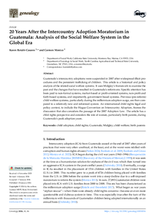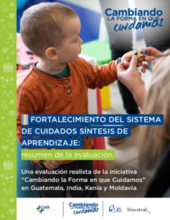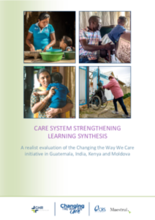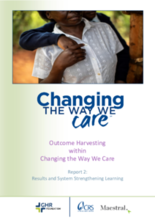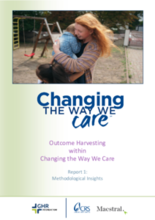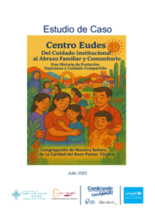This country page features an interactive, icon-based data dashboard providing a national-level overview of the status of children’s care and care reform efforts (a “Country Care Snapshot”), along with a list of resources and organizations in the country.
demographic_data
childrens_living_arrangement
children_living_without_bio
adoption
key_stakeholders
Key Stakeholders
Add New DataOther Relevant Reforms
Add New Datadrivers_of_institutionalisation
Drivers of Institutionaliziation
Add New Datakey_research_and_information
Key Data Sources
Add New DataPrevalence and number of children living in institutional care: global, regional, and country estimates
Reglamento de la Procuraduría de la Niñez y la Adolescencia de la Procuraduría General de la Nación
Revisión del gasto público asociado al cuidado de la niñez y adolescencia en Guatemala (2015 - 2019)
Acknowledgements
Data for this country care snapshot was contributed by a consultant with Maestral International and partners at Changing the Way We Care.
Displaying 1 - 10 of 162
This article analyzes Guatemala’s child welfare and intercountry adoption systems before and after the 2007 suspension, using Midgley’s framework to examine reforms across non-formal, market-based, non-profit, faith-based, and government systems. Framed by international child rights law, including the Hague Convention, it highlights the shift from illicit, profit-driven adoption practices toward a reformed system while centering child rights and the experiences of birth mothers during the peak adoption era.
Cambiar la Forma en que Cuidamos (CTWWC, por sus siglas en inglés) es una iniciativa global que promueve un cuidado familiar seguro y afectuoso para los niños.
Changing the Way We Care’s “Care System Strengthening Learning Synthesis: Evaluation Summary” distills lessons from care reform efforts in four countries, examining how change happened across laws, workforce, financing, monitoring, and services. It finds that evidence-based advocacy, strong government ownership, collaboration, and capacity-building were central to driving and sustaining reform across diverse contexts.
This report presents findings from an evaluation by Changing the Way We Care (CTWWC) that used a realist approach to examine how care reform progressed in Guatemala, India, Kenya, and Moldova across five key system components. It identifies advocacy, government ownership, collaboration, and capacity-building as major drivers of change and offers recommendations for governments and partners to embed family care in national systems, strengthen coordination and workforce capacity, and sustain reforms through evidence, shared learning, and long-term commitment.
Changing the Way We Care (CTWWC) is a global initiative which promotes safe, nurturing family care for children.
At the close of the Changing the Way We Care (CTWWC) The Changing the Way We Care (CTWWC) initiative launched in 2018 with the aim to reform child care systems by promoting safe, nurturing family-based care over institutional ca
At the close of the Changing the Way We Care (CTWWC) The Changing the Way We Care (CTWWC) initiative launched in 2018 with the aim to reform child care systems by promoting safe, nurturing family-based care over institutional ca
Este documento es un estudio de caso basado en la historia de transformación del Hogar Esquipulas, liderada por la Asociación de Religiosas Franciscanas de San Antonio en Esquipulas, Chiquimula, Guatemala, representa un testimonio inspirador del compromiso profundo con el bienestar de los niños, niñas y adolescentes.
A Guatemalan judge has found six people guilty over the deaths of 41 girls in a raging 2017 fire at a state shelter for vulnerable youths that had a history of abuse. The sentencing is a step towards closure in one of the most horrific and deadly events in Guatemalan history. The tragedy drew international attention and highlighted pervasive abuse in the government’s shelter system.
Desde Tijuana, este relato muestra cómo una comunidad religiosa, las Hermanas de Nuestra Señora de la Caridad del Buen Pastor, decidió pasar de un modelo institucional de cuidado a un enfoque centrado en las familias y la vida comunitaria, priorizando el derecho de cada niña, niño y adolescente a crecer en un entorno seguro, amoroso y protector.

